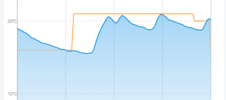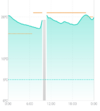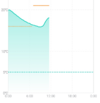- Joined
- 27 Jan 2008
- Messages
- 23,679
- Reaction score
- 2,668
- Location
- Llanfair Caereinion, Nr Welshpool
- Country

If I feel warm at 20ºC that's the temperature I feel warm at, and it really does not matter what the weather outside is doing. I can see if going to be a warm day, better to allow home to remain cool in the morning so don't need AC latter in the day, but this is forecasting, not compensation, and yes smart thermostats may be able to forecast the weather.
I ask as I have a problem, with a hysteresis in room temperatures. This is likely due to three independent devices trying to control the room temperature, the boiler cycles on/off, the wall thermostat cycles on/off, and the TRV tries to modulate radiator output. So at the moment the wall thermostat has over shoot the mark
This is likely due to three independent devices trying to control the room temperature, the boiler cycles on/off, the wall thermostat cycles on/off, and the TRV tries to modulate radiator output. So at the moment the wall thermostat has over shoot the mark
 and until the hall has cooled the TRV can't possibly heat living room. It shows outside at 10ºC and raining
and until the hall has cooled the TRV can't possibly heat living room. It shows outside at 10ºC and raining
 and yes found on warm days like today the wall thermostat works better if it raises by 0.5ºC every two hours, but on a cold day works better if it goes straight to 20ºC. But can't find any way to program in a different method depending on weather outside.
and yes found on warm days like today the wall thermostat works better if it raises by 0.5ºC every two hours, but on a cold day works better if it goes straight to 20ºC. But can't find any way to program in a different method depending on weather outside.
So all well and good the thermostat telling me it's raining, I could simply look out of the window, but what change does it make to the heating by knowing when it's raining?
I ask as I have a problem, with a hysteresis in room temperatures.
 This is likely due to three independent devices trying to control the room temperature, the boiler cycles on/off, the wall thermostat cycles on/off, and the TRV tries to modulate radiator output. So at the moment the wall thermostat has over shoot the mark
This is likely due to three independent devices trying to control the room temperature, the boiler cycles on/off, the wall thermostat cycles on/off, and the TRV tries to modulate radiator output. So at the moment the wall thermostat has over shoot the mark So all well and good the thermostat telling me it's raining, I could simply look out of the window, but what change does it make to the heating by knowing when it's raining?




